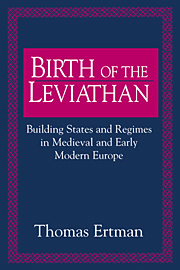Book contents
- Frontmatter
- Contents
- List of Tables
- Acknowledgments
- 1 INTRODUCTION
- 2 THE ORIGINS OF PATRIMONIAL ABSOLUTISM IN LATIN EUROPE
- 3 THE TRIUMPH OF PATRIMONIAL ABSOLUTISM AND THE FAILURE OF REFORM IN LATIN EUROPE, c. 1500–1789
- 4 BUREAUCRATIC CONSTITUTIONALISM IN BRITAIN
- 5 BUREAUCRATIC ABSOLUTISM IN GERMANY
- 6 THE TRIUMPH OF PATRIMONIAL CONSTITUTIONALISM IN HUNGARY AND POLAND AND ITS PREMATURE DEMISE IN SCANDINAVIA
- 7 CONCLUSION
- Bibliography
- Index
6 - THE TRIUMPH OF PATRIMONIAL CONSTITUTIONALISM IN HUNGARY AND POLAND AND ITS PREMATURE DEMISE IN SCANDINAVIA
Published online by Cambridge University Press: 12 March 2010
- Frontmatter
- Contents
- List of Tables
- Acknowledgments
- 1 INTRODUCTION
- 2 THE ORIGINS OF PATRIMONIAL ABSOLUTISM IN LATIN EUROPE
- 3 THE TRIUMPH OF PATRIMONIAL ABSOLUTISM AND THE FAILURE OF REFORM IN LATIN EUROPE, c. 1500–1789
- 4 BUREAUCRATIC CONSTITUTIONALISM IN BRITAIN
- 5 BUREAUCRATIC ABSOLUTISM IN GERMANY
- 6 THE TRIUMPH OF PATRIMONIAL CONSTITUTIONALISM IN HUNGARY AND POLAND AND ITS PREMATURE DEMISE IN SCANDINAVIA
- 7 CONCLUSION
- Bibliography
- Index
Summary
It is one of the most remarkable features of European political development that the two states within western Christendom whose political regimes most resembled that of 18th-century Britain – the kingdoms of Poland and Hungary – were among the farthest removed from it not only geographically, but also culturally, socially, and economically. Like Britain, Poland and Hungary possessed bicameral representative assemblies which enjoyed substantial rights of co-determination in matters of taxation, foreign affairs, and legislation, and the statutes which these bodies drafted and approved served to expand a corpus of national customary law which, as in England, successfully resisted the reception of Roman law. Like the British Parliament, the Polish and Hungarian Diets consisted of an upper chamber comprising ecclesiastical and lay worthies and a lower chamber composed of the elected representatives of royal towns and of territorially integrated rural districts. Finally, the assemblies of these districts (ziemie or provinces in Poland, counties in Hungary) and the nonprofessional officials chosen from among their members exercised extensive powers in the spheres of justice, finance, and military affairs, as they did in Britain.
Yet despite these similarities, the Hungarian and Polish polities of the 18th century were in other respects quite different from their British counterpart. Whereas in Britain the organs of local self-government merely served to complement a large, bureaucratically organized administrative infrastructure, in Poland and Hungary such a bureaucracy was entirely lacking.
- Type
- Chapter
- Information
- Birth of the LeviathanBuilding States and Regimes in Medieval and Early Modern Europe, pp. 264 - 316Publisher: Cambridge University PressPrint publication year: 1997



